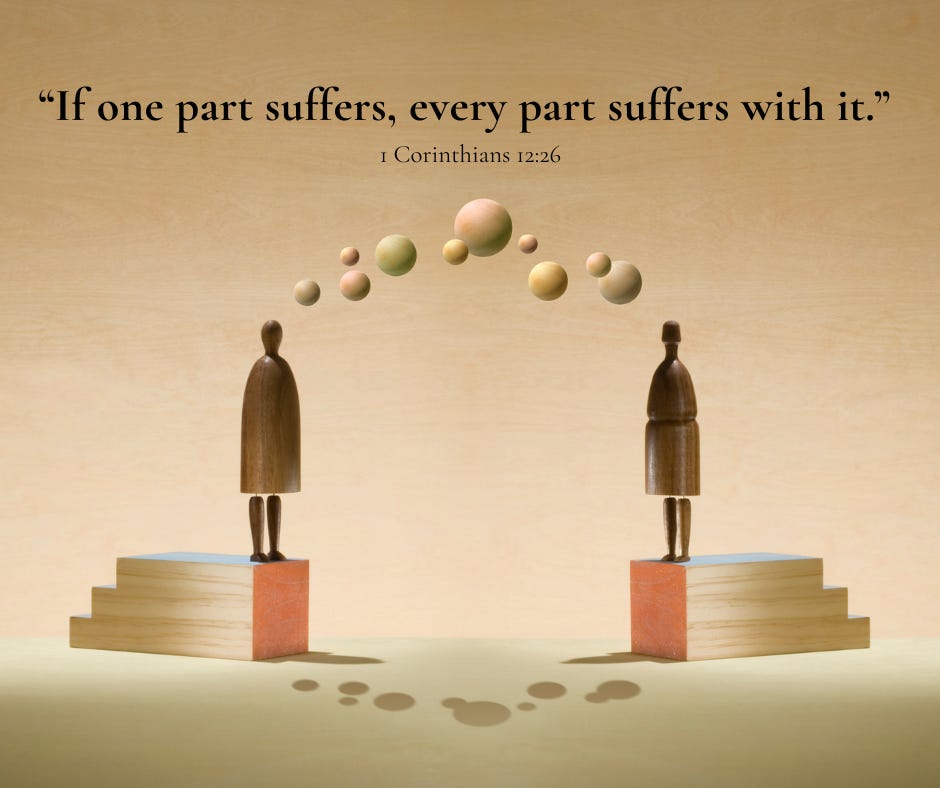Spiritual Entanglement
when the ache isn’t just yours
Awhile ago, I shared about parent/child entanglement … but since then I’ve been thinking that this spiritual connectedness we can experience—what I’ve been calling ‘entanglement’— may be quietly present in more places than you’d think.
For example, in the animal kingdom, we all accept that they can sense their humans’ emotions. A dog can warn of a seizure or a panic attack, or simply sit close to a child in quiet comfort. A cat may curl up beside sorrow, and a horse can feel the tension of its rider in an instant. No one questions it. No one writes it off as woo-woo or coincidence. We just nod and say with a smile, “They just know.”
So here’s the question I can’t stop thinking about: If a dog can sense what I’m feeling…why do I doubt when I sense what someone else is feeling?
Here’s my working theory: Maybe what I sometimes feel isn’t just my body or emotions misfiring, but the Spirit nudging me toward another person’s need. When I wake up in the middle of the night with a heaviness I can’t name, maybe it’s not always the pizza I had for dinner, but a burden to intercede for someone else in distress.
I mean, usually I just replay yesterday, scan my body, dig through my thoughts looking for the source.
Is it stress?
Did I eat something weird?
Is it hormones?
Did I forget to do something important?
But sometimes the answer is: no. There’s no obvious reason why I’m feeling down. So what if the weight I’m carrying isn’t just random or chemical, but the Spirit drawing my attention to pray?
The longer I’ve been looking at this, the more I’ve come to believe: we’re sensing more than we think. We carry what we can’t always explain. But many of us have been taught to look only for physical or emotional reasons, and rarely for spiritual ones—like the Spirit burdening us to intercede.
We can believe animals are emotionally attuned because, whether by instinct or design, they don’t overthink sorrow—they just sense it. They’re pure. Present. Instinctive. They don’t explain away someone’s sadness. They just respond to it with empathy.
But us? We can analyze it to death. If I feel a deep sense of sadness out of nowhere, I assume something’s wrong with me. If I’m carrying a strange sense of urgency or burden, I think it must be anxiety. If my body feels heavy or my soul uneasy, I rush to “fix” it, label it, or numb it. But what if, instead of misdiagnosing it, I paused to ask if it could be a holy invitation—to bear another’s burden in prayer?
What if this isn’t dysfunction, but design? The Bible tells us that,
“If one part suffers, every part suffers with it.” (1 Corinthians 12:26).
Maybe that’s more true than we’ve realized. Charles Spurgeon once said, “Intercessory prayer is the sweetest prayer God ever hears.” This sweet word drives me to treat every unexplained heaviness as a summons to pray, knowing that God delights most in the prayers I lift for others. And while I may never be able to prove the source of those aches, thinking this way does something—it sends me to the Savior, and it calls me to intercede. Both are better places to be than worrying about what’s wrong with me.
When someone on the other side of the city—or the world—is suffering, is it really so far-fetched to believe that the Holy Spirit within you might stir your heart to pray for them, even if you don’t know why?
What if bad feelings are not always problems to fix, but invitations to prayer?
And burdens that come out of nowhere are not always proof of generalized anxiety, but reminders to cast our cares on God and intercede for others?
You don’t need to know whose grief it is. You don’t need to understand why the melancholy has settled in your chest.
You just need to pause.
To breathe.
To ask:
“Lord, is this ache mine—or are You calling me to pray for someone else?
What would You have me do with it?”
Then:
Release the panic.
Cast your anxiety on God (1 Peter 5:7), even if you don’t understand the source.
Keep the compassion and don’t shut down the ache, but surrender it.
Turn it into a prayer: “Lord, I lift this heaviness to You. You know who it belongs to. Wrap them in comfort. Be near. Guide me, if You will—but carry them, because only You can.”
I trust the unseen God. I believe that even if I never know the source, He does.
And my response in prayer still matters.
Every believer is spiritually connected to every other believer by the same Spirit that lives in us all. (See Romans 12:5; Ephesians 4:3-4)
Like dogs who sit quietly in our sadness, horses who mirror tension, or little children who burst into tears when someone else is sad, as members of one body we’re meant to feel the pain of others—not as a mystical experience, but as part of the Spirit’s design for His church.
This isn’t you absorbing their pain, like a savior, but you receiving a call. And God giving you the grace to pass it on in prayer.
So the next time you feel something you can’t explain, when the mood drops out of nowhere, when your chest tightens and nothing adds up, you can turn inward and look for the problem, or you can treat it as an invitation to pray. Because if a dog can feel it, why shouldn’t you?
Maybe this is how love flows in a broken world—not through intuition or guesswork, but through the Spirit’s quiet prompting that moves us to compassion, intercession, and obedience.
“Rejoice with those who rejoice. Weep with those who weep.” (Romans 12:15)
“Bear one another’s burdens.” (Galatians 6:2)
So when the heaviness comes, when sorrow sneaks in uninvited, pause long enough to wonder: what if this ache is a call, not a curse?
Because sometimes the most faithful thing you can do is stop explaining yourself and start interceding for someone else.
These aren’t just calls to compassion—they’re descriptions of the spiritual reality we live in but often ignore. We ARE one body.
“Just as a body, though one, has many parts, but all its many parts form one body, so it is with Christ. For we were all baptized by one Spirit so as to form one body—whether Jews or Gentiles, slave or free—and we were all given the one Spirit to drink.” (1 Corinthians 12:12–13)
Bonus Resources on Prayer & Anxiety -







I believe this is what you are talking about...my nephew was deployed, his unit was out on maneuvers. In the middle of the night women from church woke up praying specifically for him. We did not know his unit was under fire at this time. Weeks later we found out that my nephew did get shot in the back. He did not feel it at all only knew by the hole in his gear on his back. Prayer saved his life.
I so agree. Thank you for sharing.